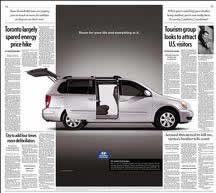Commercial television and radio stations tend to get all their income from advertisers. Tens of billions of dollars are spent every year just on television advertising and the media does its best to create a media product that suits those advertisers.
Whilst audiences may consider the advertisements as an unwelcome interruption to their news and entertainment, in reality that news and entertainment is a way of attracting people to the medium so they will be exposed to the advertisements—a  way of delivering audiences for advertisers. “TV works like a Trojan horse: it gains entry into our homes with promises of entertainment and novelty, then delivers its true cargo of commercial messages.”
way of delivering audiences for advertisers. “TV works like a Trojan horse: it gains entry into our homes with promises of entertainment and novelty, then delivers its true cargo of commercial messages.”
Throughout the 20th century, newspapers depended less on reader subscriptions and payments and more on advertising for their incomes. Between 1950 and 1980 they had a 40 per cent drop in sales whilst profits skyrocketed. During this same period control of newspapers became more corporate, “hastening the conversion of newspapers to primarily carriers of advertising.”
Dependence on advertising has meant newspapers have become less responsive to reader desires and more responsive to corporate requirements. The modern newspaper has been shaped by the demands of advertisers:
You name it: the appearance of ads throughout the pages, the ‘jump’ or continuation of a story from page to page, the rise of sectionalization (as with news, cartoons, sports, financial, living, real estate), common page size, halftone images, process engraving, the use of black-and-white photography, then color, sweepstakes, and finally discounted subscriptions were all forced on publishers by advertisers hoping to find target audiences.